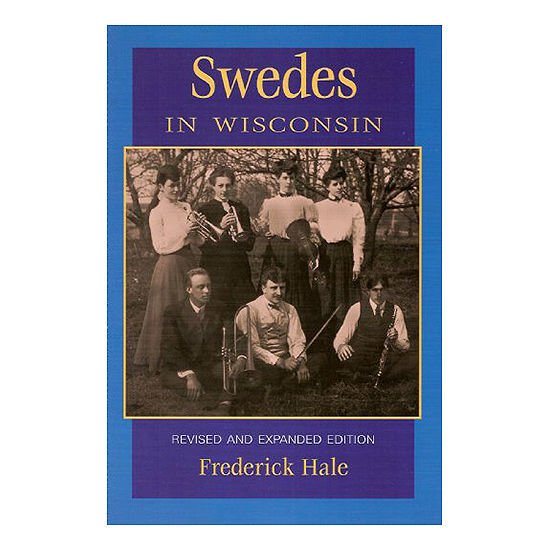Swedes in Wisconsin
By Frederick Hale
WHS Press's revised and expanded edition of Frederick Hale's Swedes in Wisconsin begins with the story of the state's first legal Swedish immigrants, a group of six young people and a hunting dog who set sail from Gavle, Sweden, in 1841 and established Wisconsin's first Swedish settlement, New Uppsala, along Pine Lake in Waukesha County. Hale describes the mass emigration from Sweden to the Midwest that began during the late 1860s and fundamentally changed both Sweden and the Midwest. During this time more than a million Swedes left their homeland for North America, motivated at least in part by a huge population surge that overtaxed Sweden's relatively small amount of arable land (agriculture served until the twentieth century as the Swedish economy's mainstay).
Updates for the new edition include new photos and excerpts from letters Swedish novelist and feminist Fredrika Bremer wrote to her sister while touring the Wisconsin frontier in the autumn of 1850. An English translation of Bremer's travel accounts was published in 1856 as Homes of the New World. Of her visit to the Swedish settlement at Pine Lake and acquaintance with a widow and her eight children, Bremer writes:
"She felt herself worn out, old, and finished before her time, as she said; but still did not regret having come to America, because, as regarded her children and their future, she saw a new world opened to them, richer and happier than that which the mother country could have offered them, and she would have been glad to have purchased this future for them at the sacrifice of her own life; she would be well contented to go down to the grave, even before her time, and there to have done with her crutch."
By Frederick Hale
WHS Press's revised and expanded edition of Frederick Hale's Swedes in Wisconsin begins with the story of the state's first legal Swedish immigrants, a group of six young people and a hunting dog who set sail from Gavle, Sweden, in 1841 and established Wisconsin's first Swedish settlement, New Uppsala, along Pine Lake in Waukesha County. Hale describes the mass emigration from Sweden to the Midwest that began during the late 1860s and fundamentally changed both Sweden and the Midwest. During this time more than a million Swedes left their homeland for North America, motivated at least in part by a huge population surge that overtaxed Sweden's relatively small amount of arable land (agriculture served until the twentieth century as the Swedish economy's mainstay).
Updates for the new edition include new photos and excerpts from letters Swedish novelist and feminist Fredrika Bremer wrote to her sister while touring the Wisconsin frontier in the autumn of 1850. An English translation of Bremer's travel accounts was published in 1856 as Homes of the New World. Of her visit to the Swedish settlement at Pine Lake and acquaintance with a widow and her eight children, Bremer writes:
"She felt herself worn out, old, and finished before her time, as she said; but still did not regret having come to America, because, as regarded her children and their future, she saw a new world opened to them, richer and happier than that which the mother country could have offered them, and she would have been glad to have purchased this future for them at the sacrifice of her own life; she would be well contented to go down to the grave, even before her time, and there to have done with her crutch."
By Frederick Hale
WHS Press's revised and expanded edition of Frederick Hale's Swedes in Wisconsin begins with the story of the state's first legal Swedish immigrants, a group of six young people and a hunting dog who set sail from Gavle, Sweden, in 1841 and established Wisconsin's first Swedish settlement, New Uppsala, along Pine Lake in Waukesha County. Hale describes the mass emigration from Sweden to the Midwest that began during the late 1860s and fundamentally changed both Sweden and the Midwest. During this time more than a million Swedes left their homeland for North America, motivated at least in part by a huge population surge that overtaxed Sweden's relatively small amount of arable land (agriculture served until the twentieth century as the Swedish economy's mainstay).
Updates for the new edition include new photos and excerpts from letters Swedish novelist and feminist Fredrika Bremer wrote to her sister while touring the Wisconsin frontier in the autumn of 1850. An English translation of Bremer's travel accounts was published in 1856 as Homes of the New World. Of her visit to the Swedish settlement at Pine Lake and acquaintance with a widow and her eight children, Bremer writes:
"She felt herself worn out, old, and finished before her time, as she said; but still did not regret having come to America, because, as regarded her children and their future, she saw a new world opened to them, richer and happier than that which the mother country could have offered them, and she would have been glad to have purchased this future for them at the sacrifice of her own life; she would be well contented to go down to the grave, even before her time, and there to have done with her crutch."






